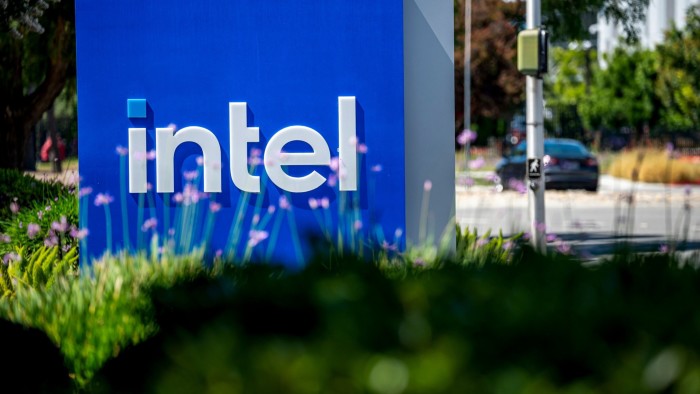Unlock the Editor’s Digest for free
Roula Khalaf, Editor of the FT, selects her favourite stories in this weekly newsletter.
Intel will spin off its venture capital unit as the troubled US chipmaker seeks to cut costs and faces more scrutiny over its investments in China.
Intel said on Tuesday it would separate Intel Capital, a prominent Silicon Valley investor that has ploughed more than $20bn into about 1,800 companies since it launched in 1990, into a new, standalone fund.
The move would bring Intel Capital’s corporate structure “into alignment with other leading venture firms”, the company said. Intel would remain an anchor investor in the new venture fund, which would begin operations under a new name in the second half of the year, it said.
The fund will now be able to raise capital from external sources for the first time. It had previously relied on a yearly budget allocation from Intel.
Intel’s interim co-chief executive, David Zinsner, said spinning off its venture arm was a “win-win scenario as it provides the fund with access to new sources of capital to expand its franchise while allowing both companies to continue benefiting from a productive long-term strategic partnership”.
The decision follows a series of cost-cutting measures at Intel after a nightmare year for the company in 2024. Intel shares are down about 60 per cent on a year ago as the company has fallen behind on manufacturing and designing leading-edge chips.
In December, Zinsner told a Barclays conference that Intel would be constantly “scrutinising where we are spending money and making sure we get the appropriate return”, as the company’s board pushed for “focus” on its core business.
Former chief executive Pat Gelsinger was ousted by the board in December as tensions rose over his five-year capital-intensive plan to turn the company into a manufacturing powerhouse to rival Taiwan’s TSMC. The multibillion-dollar plan came amid pressure on its core chip design business from competitors such as AMD and Nvidia.
Gelsinger was replaced by two interim co-CEOs: chief financial officer Zinsner and product chief Michelle Johnston Holthaus.
Intel Capital has faced scrutiny in Washington over its exposure to Chinese technology companies. The US has sought to restrict flows of capital to Chinese groups, including this month effectively banning investment in companies producing technology such as AI, quantum computing and semiconductors.
Sequoia Capital and GGV Capital, formerly two of the largest US venture investors in China, spun out their Chinese businesses in 2023 under mounting political pressure.
Intel Capital has continued to invest in China, owning stakes in 43 China-based technology start-ups as recently as last year, the Financial Times reported. Since the venture fund was launched in the 1990s, it has invested in more than 120 Chinese groups, according to data provider Crunchbase. Its investments have included chipmaker Horizon Robotics and Eeasy Tech, which designs AI chips for facial recognition.
Zinsner was the architect of a big cost-cutting initiative announced in September, which paused major manufacturing plans in Germany and Poland and aimed to drastically cut the company’s real estate footprint. It followed an earlier move in August to axe 15,000 jobs.
Gelsinger’s departure came just days after the Biden administration threw its weight behind Intel by finalising a nearly $8bn direct subsidy for its manufacturing in the US under the 2022 Chips Act.
Intel is still seeking a permanent chief executive, who will have to confront difficult questions about how turn around the company, including pressure to spin off its manufacturing business.
Source link









